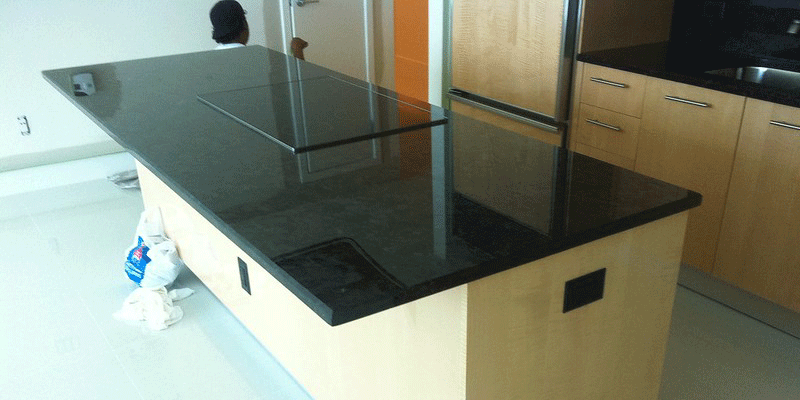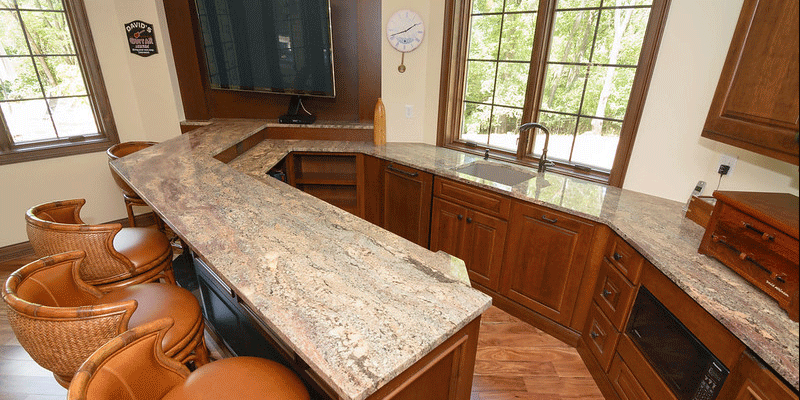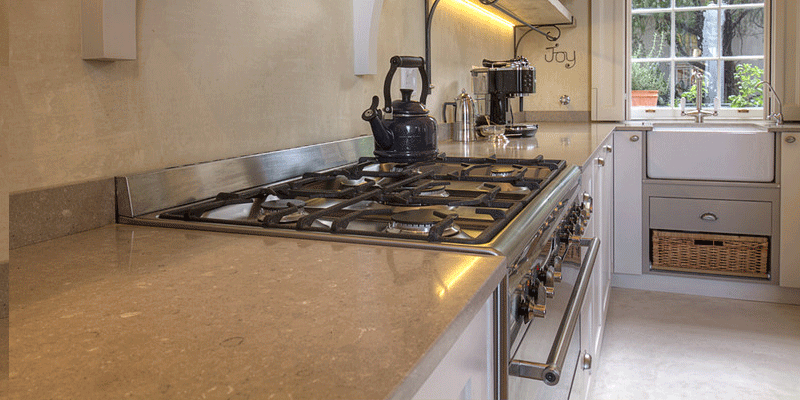Learn the Key Differences

Granite and quartz are both popular choices for kitchen countertops and bathroom vanities, and other surfaces due to being tough, moisture resistant, and durable. However, these two materials have a few key differences that homeowners should be familiar with before deciding which material to purchase.
Granite

Granite is a natural stone that can vary greatly in color and pattern. Granite stones are quarried out of the ground, leaving behind a pit or hole in the surface where it was once located. Since granite is a natural stone, it comes with many interesting features such as veins and fissures, which give it an attractive, unique appearance. Granite countertops are generally available in black, gray, beige, and white colors and a mix of different colors.
There are two types of granite: igneous and sedimentary. Igneous granite takes millions of years to form as magma is cooled by layers of rock above it. Sedimentary types of granite are made from stones that have been compressed over time into ridges or layers.
Granite is known for its high level of hardness, which makes it very resistant to scratching. It can withstand heat and humidity better than most natural stones, including marble. The only downside to granite is that it does not come in a variety of colors, so it is not the best choice if you are looking for something with a lot of visual interest.
Quartz

Quartz is also a natural stone, but it is partly composed of crystals that have been formed under high heat and pressure. It has similar properties to granite in that it does not scratch easily, but it comes in many more colors and patterns than granite. Quartz countertops are available in every color of the rainbow, so you will be able to find one that perfectly matches your kitchen or bathroom design scheme.
Quartz is composed of 93 percent crystalline silica, which makes it unique among natural stones. This also gives quartz an incredibly hard surface that resists staining and moisture damage. Quartz countertops are non-porous, so they are easy to clean and quite stain resistant.
Quartz is available in two types, each with its own benefits. The first type of quartz is a natural stone, which is quarried right out of the ground, much like granite. However, this also makes it possible for natural quartz stones to have deep fissures and other unique visual elements.
The second type of quartz is engineered stone, which is created from quartz powder that has been combined with resin and pigments. This means that the countertop color can be consistent throughout, with no irregularities or natural markings. However, this can make remodeling or fixing specific counter areas more complex than with natural stone.
Main Differences Between Granite and Quartz:
- Granite is a natural stone, while quartz is partly manufactured.
- Granite comes in a limited number of colors and patterns, so it may not be the best choice if you are looking for a material with a lot of visual interest. Quartz is available in many bright and bold colors and subtle neutrals that can perfectly match your kitchen design scheme.
- Granite can withstand heat and humidity better than most natural stones, including marble. Quartz also has excellent heat and moisture resistance.
- Natural quartz countertops have unique visual characteristics from being a natural stone, while engineered quartz is more consistent in color and pattern throughout the countertop material. Granite is a natural stone, so it may be better for homeowners who want a countertop with plenty of visual character.
- Granite is harder than quartz. While both have excellent moisture and heat resistance, granite also offers a higher level of durability against scratches. Quartz can scratch easily in comparison to its hardness rating.
- Overall, quartz is a flexible material available in every color of the rainbow, making it easy to find a quartz countertop that perfectly matches your kitchen design scheme. Granite is more limited in colors and patterns, but it may be better for homeowners who want a durable material with plenty of visual character.
Disadvantages of Granite and Quartz:
- Granite and quartz both require regular sealing to protect them from discoloration, staining, and moisture.
- Granite and quartz both require a type of grout that is more resistant to acid.
- Granite has a lower resistance to heat than quartz, so it may not be the best choice for homeowners who have pans on their countertops or use the stove frequently.
Final Thoughts:
Overall, both materials are excellent choices for kitchens and bathrooms, so consider which properties are most important to you when comparing granite vs. quartz. If you want a natural stone with a lot of visual character, granite may be the better choice. If you want a countertop that comes in every color of the rainbow and is easy to clean and take care of, quartz is the best option.
